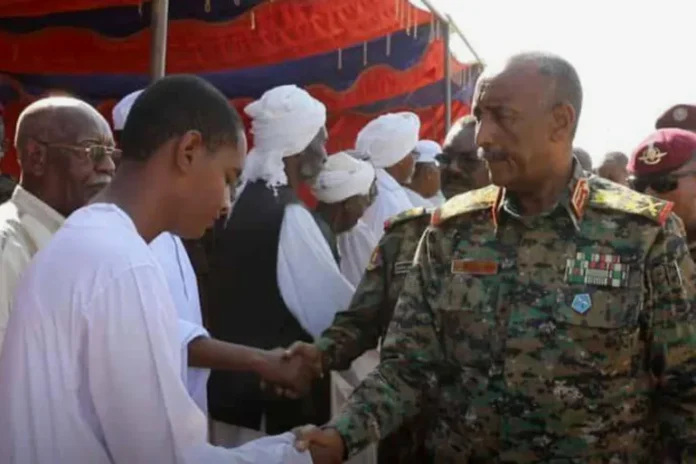Sudan’s Transitional Sovereignty Council Chairman, General Abdel Fattah al-Burhan, has reiterated his rejection of any negotiations held under the sponsorship or participation of foreign parties, affirming that the government “will not retreat from the pledge it has made,” and that any dialogue must be based on “the interest and unity of Sudan.”
At the same time, al-Burhan announced the Sovereignty Council’s readiness “to engage in talks that serve Sudan’s situation and end the war in a way that restores the nation’s dignity and unity,” but denied that any negotiations were currently taking place with any party.
His remarks came during a speech in the northern city of Atbara while offering condolences for army officer Lieutenant Colonel Muzammil Abdullah, who was recently killed in battles in El Fasher, the capital of North Darfur State, according to a statement issued by the Transitional Sovereignty Council.
Al-Burhan stressed that the armed forces “do not target specific tribes or regions,” emphasizing that their aim “is to confront the enemy,” and vowing to continue fighting “wherever that enemy may be found.”
His statements coincided with the Sudanese authorities’ announcement that a tribal leader and several dignitaries had been killed in North Kordofan State in a drone attack. The government accused the Rapid Support Forces (RSF) of carrying out the strike, an allegation the RSF denied, claiming instead that the army was responsible.
The country has been engulfed in a devastating war since April 2023 between the army and the RSF, which, according to the United Nations, has left more than 20,000 people dead and displaced or forced about 15 million others to flee their homes. A study by U.S. universities estimated the number of deaths at around 130,000.
Meanwhile, the “Quad countries”—the United States, Saudi Arabia, the United Arab Emirates, and Egypt—are pursuing efforts to reach a three-month humanitarian ceasefire agreement as a prelude to resuming the political process and forming a civilian government. These countries are scheduled to meet later in October in New York.
Civil and political groups opposing the war continue to urge the Sovereignty Council chairman and army commander to take concrete steps to end the conflict, which they have described as “the world’s worst humanitarian crisis.”


